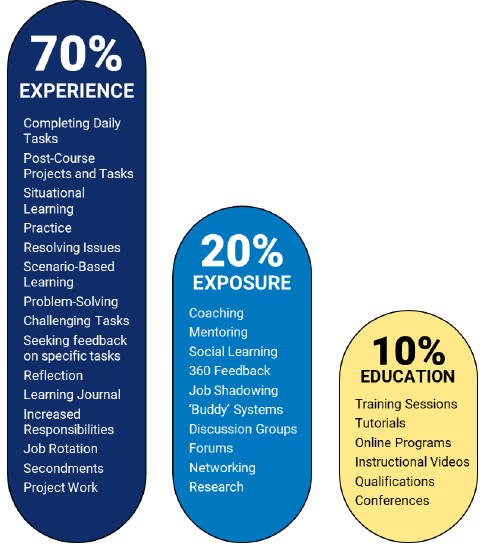The 70 20 10 Model for Employee Learning and Development: A Comprehensive Guide for Success

Introduction
In today's fast-paced business world, you need an effective learning and development strategy to ensure you and your employees acquire the skills and knowledge required to stay ahead. One such strategy is the 70 20 10 model for learning and development, which emphasises the need for a variety of approaches.
In this comprehensive guide, we’ll explore the principles, application, best practices, benefits, and real-world examples of implementing the 70 20 10 model in organisational settings.
Understanding the 70 20 10 Model
The 70 20 10 model for learning and development originated from research conducted by the Center for Creative Leadership (CCL) in the 1980s. The model was then popularised by Morgan McCall, Robert Eichinger, and Michael Lombardo in their book "The Career Architect Development Planner," published in 1996. The authors observed that people learn successfully using three key methods. They coined the term "70 20 10" to represent the approximate proportions of these different learning methods.
The 70 20 10 model suggests that skills and knowledge are acquired as follows:
Experiential learning (70%): This type of learning occurs through hands-on experience, such as on-the-job training, project-based learning, and job rotations.
Social learning (20%): This type of learning occurs through interactions with others, such as mentoring, coaching, and informal collaboration.
Formal learning (10%): This type of learning occurs through traditional training methods, such as classroom instruction, e-learning, and webinars.
It's worth noting that the 70 20 10 model is not a rigid formula but rather a guideline to encourage a balance of different learning approaches and the exact percentages may vary depending on your context, industry, or individual learning needs. The model's flexibility allows you to adapt and customise your learning initiatives to meet your specific requirements while embracing the core principles of experiential, social, and formal learning.

Since its introduction, the 70 20 10 model has gained recognition and widespread adoption in learning and development circles. It has become a guiding principle for organisations looking to design holistic and effective learning programs that go beyond traditional classroom-based training.
Why is the 70 20 10 Model Effective?
There are several reasons why the 70 20 10 model is an effective approach to your learning and development.
Experiential, social, and formal learning all have their strengths and weaknesses. By combining these different approaches, you can create a more engaging and effective learning experience. By actively participating in hands-on experiences, collaborating with others, and receiving structured instruction, employees are more likely to stay motivated and retain the knowledge and skills they acquire.
Traditional classroom-based training can be expensive, requiring dedicated facilities, trainers, and resources. In contrast, the 70 20 10 model emphasises experiential and social learning, which can be delivered at a fraction of the cost. On-the-job training, mentoring, and informal collaboration leverage existing resources within the organisation, also reducing the need for additional expenditures.
By combining different learning approaches you can ensure that employees acquire the skills and knowledge necessary to meet the strategic development goals of your organisation. Experiential learning allows employees to directly apply their learning to real-world situations, social learning promotes collaboration and knowledge sharing, and formal learning provides foundational knowledge and theoretical frameworks.
By encouraging employees to learn through experience, interact with others, and engage in formal learning activities, you create an environment where learning becomes an integral part of daily work. This culture of continuous learning enables employees to adapt to changing circumstances, acquire new skills, and stay updated with industry trends and best practices.
Finally, the 70 20 10 model recognises that individuals have different learning preferences and needs. By offering a blend of learning approaches, you can cater to various learning styles and adapt to individual employee requirements - some employees may thrive in hands-on experiences, while others may prefer social interactions or structured instruction. The model allows for customisation and flexibility, empowering employees to learn in the way that suits them best.
Best Practices for Implementing the 70 20 10 Model
In 20 years of helping organisations embed learning, we have found that there are some key steps you can take to ensure successful implementation of the 70 20 10 model. By following these tips, you can create a learning and development environment that will help your employees grow and develop, and ultimately achieve your business goals.
Align employee learning and development initiatives with business goals: By aligning your training programs with your organisational objectives, you can focus on developing skills that directly contribute to your business success.
Emphasise Managerial Support and Accountability: Engage managers as champions of the 70 20 10 model and hold them accountable for fostering a learning culture. Train managers on the principles of the model and equip them with the necessary tools to support employee development. Encourage managers to actively participate in employee learning plans, provide guidance, and offer opportunities for experiential and social learning. By involving managers in the learning process and holding them accountable, you can ensure that employee learning and development initiatives are integrated into day-to-day operations and given the necessary priority.
Provide Ongoing Coaching and Feedback: By integrating coaching and feedback into the learning process, you can enhance the effectiveness of experiential learning and facilitate skill development. Assign mentors or coaches who can guide employees through their learning journeys, providing guidance, support, and constructive feedback. Regular check-ins and performance discussions can help employees reflect on their experiences, identify areas for improvement, and accelerate their learning.
Encourage Reflective Practice: Promote reflective practice as a means of enhancing the learning experience and fostering continuous improvement. Encourage employees to regularly reflect on their experiences, both positive and negative, and extract meaningful lessons from them. This can be done through journaling of experiences when applying the learning, group discussions, or facilitated sessions. Reflective practice helps individuals gain deeper insights, identify patterns, and make connections between their experiences and the skills they have acquired.
Foster Collaboration and Knowledge Sharing: Encourage collaboration and knowledge sharing among your employees to support the social learning component of the 70 20 10 model. Create platforms and opportunities for employees to connect, share insights, and learn from one another, for example, through communities of practice, online discussion forums, mentoring programs, and cross-functional projects. By fostering a collaborative environment, you can tap into the collective wisdom of your workforce and promote continuous learning.
Embrace Technology-Enabled Learning Solutions: Besides leveraging technology for collaboration and knowledge sharing, you can use it to facilitate and enhance the formal learning component of the 70 20 10 model. E-learning platforms, learning management systems, and online course offerings provide employees with convenient access to formal learning resources. These technologies offer flexible learning opportunities, allowing employees to learn at their own pace and convenience. You may also consider incorporating virtual classrooms, webinars, and interactive multimedia content to make formal learning engaging and interactive. Embracing technology-enabled learning solutions can expand access to formal learning resources and accommodate different learning styles.
Real-World Example of Successful 70 20 10 Model Implementation
To illustrate the effectiveness of the 70 20 10 model, let's explore a real-world example:
Case Study: Embedding a Sales through Service Culture for a Health Insurance Provider
Client Overview:
Neural Networks had the privilege of working with a large health insurance provider. The client had a pressing need to embed a sales-through-service culture across their teams but had encountered challenges in implementing this cultural shift due to an overreliance on formal training alone. This had proved insufficient in creating lasting behavioural change and employees struggled to apply the acquired skills and behaviour in their day-to-day interactions with customers, hindering the desired cultural transformation.
Neural Networks' Approach:
Neural Networks adopted a Train-the-Trainer approach to maximise internal capability and promote program embedding. It also offered a more cost-effective approach to delivery and rollout. Neural Networks’ Train-the Trainer approach includes robust criteria for accreditation and quality assurance, providing an exciting opportunity for internal trainers to develop their expertise.
Applying the principles of 70 20 10, a comprehensive program was designed to build the skills and knowledge of the participants, focusing on a blended learning approach. This solution encompassed a range of strategies to embed new behaviours and ensure long-term sustainability. The program included pre-work activities, face-to-face facilitated workshops, reflective journals, small group embedding sessions, individual coaching sessions, and on-the-job reference materials.
The pre-work activities were carefully designed to establish a foundational understanding of the sales through service culture. This primed participants for the face-to-face workshops, where they engaged in interactive sessions, role-plays, and group discussions facilitated by Neural Networks' expert trainers.
The inclusion of reflective journals allowed participants to introspect, evaluate their progress, and identify areas for improvement. Small group embedding sessions further enhanced the learning experience by providing a supportive environment for peer-to-peer knowledge sharing and a safe space to apply new skills. On-the-job reference materials were also made available, empowering participants to reinforce newly acquired skills and knowledge in real-world scenarios.
Line managers and leaders play a crucial part in enabling culture change and the embedding of new skills and behaviours, so as well as attending workshops with their people, managers were also provided with coaching skills and ongoing support.
Results and Benefits:
The Train-the-Trainer approach empowered the client's internal trainers to cascade the program throughout the sales and service departments, creating a ripple effect of cultural change. It also enabled them to take all new hires through the same program, ensuring consistency and buy-in from day one of employment. Furthermore, the client was equipped with the internal capability to continually reinforce and adapt the sales through service culture to meet evolving customer needs and industry trends.
The comprehensive program provided participants with ongoing support and multiple avenues for growth, resulting in a tangible shift in their behaviours. Participants not only gained a deep understanding of the sales through service culture but also developed the necessary skills to effectively implement it. The embedding of a sales through service culture had a positive impact on customer interactions, leading to increased customer satisfaction and improved sales performance.
Neural Networks
Since 2000, Neural Networks has partnered with organisations to facilitate skills development and culture change through customised employee development programs. As one of Australia’s leading professional development providers, we deliver innovative learning development programs in sales, customer service, leadership and culture change.
Sign up for the Neural Networks Newsletter
Join our mailing list to receive information on leadership, sales, and emotional intelligence.

 +61 9555 7955
+61 9555 7955